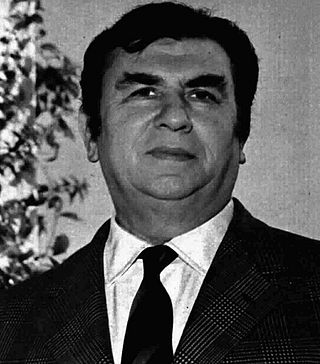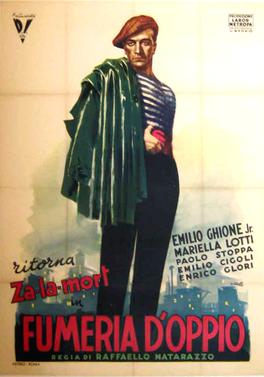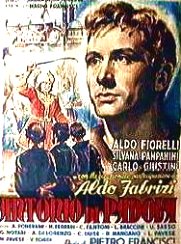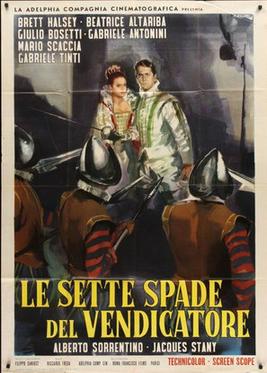
Riccardo Freda was an Italian film director. He worked in a variety of genres, including sword-and-sandal, horror, giallo and spy films.

Luigi Cervi, better known as Gino Cervi, was an Italian actor. He was best known for portraying Peppone in a series of comedies based on the character Don Camillo (1952–1965), and police detective Jules Maigret on the television series Le inchieste del commissario Maigret (1964–1972).

Paolo Stoppa was an Italian actor.

The Captain's Daughter is a 1947 Italian historical adventure film directed by Mario Camerini and starring Irasema Dilián, Amedeo Nazzari and Vittorio Gassman. It was one of a number of ambitious historical epics made in the wake of the successful 1946 film The Black Eagle. The film's sets were designed by the art director Piero Filippone. It was entered into the 1947 Cannes Film Festival. It is based on the 1836 novel of the same name by Alexander Pushkin, which is set in Russia during the reign of Catherine II. It takes place during the Cossack Rebellion.

Les Miserables is a 1948 Italian drama film directed by Riccardo Freda. It is based on the Victor Hugo's 1862 novel Les Misérables and stars Gino Cervi as Jean Valjean, Valentina Cortese as Fantine and Cosette, and Hans Hinrich as Javert. After the financial success of Freda's previous film The Black Eagle, Freda worked a deal with Lux Film and began developing an adaptation of Les Misérables with Mario Monicelli, Vittorio Nino Novarese and Stefano Vanzina. The film was shot entirely in Rome.

Eternal Melodies is a 1940 Italian historical drama film directed by Carmine Gallone and starring Gino Cervi, Conchita Montenegro and Luisella Beghi. It was one of several musical biopics directed by Gallone. The film was shot at Cinecittà in Rome.

The Black Eagle is a 1946 Italian historical adventure drama film directed by Riccardo Freda and starring Rossano Brazzi, Irasema Dilián and Gino Cervi. It was released as Return of the Black Eagle in the United States. The film is based on the unfinished 1832 Russian novel Dubrovsky by Alexander Pushkin (1799–1837). It was followed by a 1951 sequel Revenge of the Black Eagle, also directed by Freda.

The Gay Swordsman is a 1950 Italian historical adventure film directed by Riccardo Freda and starring Carlo Ninchi, Gianna Maria Canale and Franca Marzi.
The Return of Don Camillo is a 1953 French-Italian comedy film directed by Julien Duvivier and starring Fernandel, Gino Cervi and Édouard Delmont. The film's sets were designed by Virgilio Marchi. It was the second of five films featuring Fernandel as the Italian priest Don Camillo and his struggles with Giuseppe 'Peppone' Bottazzi, the Communist Mayor of their rural town.

The Opium Den is a 1947 Italian crime film directed by Raffaello Matarazzo and starring Emilio Ghione Jr., Mariella Lotti, and Emilio Cigoli. It was an unsuccessful attempt to revive the Za La Mort character, who had been a popular figure during the silent era. Ghione jr. was the son of the actor Emilio Ghione who had originally played the role.

Anthony of Padua is a 1949 Italian historical drama film directed by Pietro Francisci and starring Aldo Fiorelli, Silvana Pampanini and Carlo Giustini. The film portrays the life of Anthony of Padua (1195–1231).
The Queen of Navarre is a 1942 Italian "white-telephones" historical film directed by Carmine Gallone and starring Elsa Merlini, Gino Cervi and Renato Cialente. It was made at the Cinecittà Studios in Rome, based on a play by Eugène Scribe. The film portrays a series of intrigues at the Madrid court of Charles V in the Sixteenth century.

The Seventh Sword is a 1962 Italian-French adventure film directed by Riccardo Freda. It is a remake of Freda's debut film Don Cesare di Bazan.
Non canto più is a 1945 Italian comedy film directed by Riccardo Freda and starring Enzo Fiermonte, Vera Bergman and Paola Borboni. The film originally began shooting several years earlier, but its production was heavily delayed due to wartime conditions and it wasn't released until 1945.

Beatrice Cenci is a 1956 French-Italian historical drama film directed by Riccardo Freda and starring Micheline Presle, Gino Cervi and Fausto Tozzi. It is a biopic of Beatrice Cenci, a young Roman noblewoman who murdered her abusive father, Count Francesco Cenci.

Trapped in Tangiers is a 1957 spy film directed by Riccardo Freda and starring Edmund Purdom.

The Sinner is a 1940 Italian drama film directed by Amleto Palermi and starring Paola Barbara, Vittorio De Sica, and Fosco Giachetti.

Torrents of Spring is a 1942 Italian drama film directed by Nunzio Malasomma and starring Gino Cervi, Mariella Lotti and Vanna Vanni. It was shot at the Cinecittà Studios in Rome. The film's sets were designed by the art directors Alfredo Montori and Mario Rappini.















